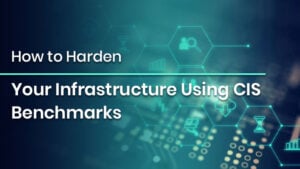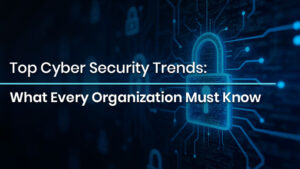
How to Harden Your Infrastructure Using CIS Benchmarks
How to Harden Your Infrastructure Using CIS Benchmarks Introduction As more organizations go faster with their digital transformation, the security and resilience of IT infrastructure
Limited-Time Offer! Get an exclusive 40% OFF on IPSpecialist Premium Monthly & Annual Plans. Use Promo Code: UPSKILLNOW at checkout.

How to Harden Your Infrastructure Using CIS Benchmarks Introduction As more organizations go faster with their digital transformation, the security and resilience of IT infrastructure

Azure Certifications – Validate Your Azure Cloud Skills Introduction Cloud computing has transformed the business landscape, providing scalability, flexibility, and affordability in a way

Top Cyber Security Trends: What Every Organization Must Know Introduction In an era marked by digital transformation, remote workforces, and rapidly evolving threat landscapes,
Table of Contents
The growing popularity of containerized applications has highlighted the need for appropriate container orchestration platforms to support large-scale applications.
Many products have been developed to meet the need for container management throughout their lifecycle. These container orchestration products include open-source solutions. This article covers detailed knowledge of AWS ECS and EKS and their differences.
Check out our AWS Courses now if you want to start your career in Cloud Computing.
A container is a small, portable, executable package containing all the components needed to run an application, including the application itself and any necessary configurations, dependencies, system libraries, etc. The development and deployment of applications are significantly streamlined by containerization. However, in order to operate containers, we require the following:
While applications are contained within containers, the remaining facilities needed for the container’s lifetime are provided by a platform for container management or orchestration.
The Elastic Container Service (ECS) is often misunderstood as a simplified version of Kubernetes. The Elastic Container Service is a container orchestration service provided by AWS. ECS is designed to be simple without sacrificing management features. It integrates easily with AWS services like AWS Application/Network load balancers and CloudWatch.
Amazon Elastic Container Service’s scheduler is used to determine the following:
The Elastic Kubernetes Service (EKS) is a Kubernetes Cluster that is fully managed.
The Elastic Kubernetes Service provides all of Kubernetes’ features and flexibility while leveraging the service’s managed nature. However, all of these advantages come at the expense of increased complexity in the overall application architecture.
EKS deploys and manages containers using the Kubernetes concept of Pods, whereas ECS deploys them directly using individual containers. Pods contain one or more containers that share a resource pool and provide greater flexibility and fine-grained control over service components.
Without a doubt, EKS is the more powerful platform. However, this does not imply that EKS is the default option for any workload. With its simplicity and feature set, ECS is still suitable for many workloads.
ECS: Simple to deploy, no control plane required, configuration and deployment via the AWS management console. Less expertise and operational knowledge are required.
EKS: More difficult deployment because you must first configure and deploy pods using Kubernetes. Expertise is required.
ECS and EKS are AWS proprietary technologies that may result in vendor lock-in.
ECS: There is a maximum number of ENIs per instance. You may need more than support all of the containers you want to run on a given instance.
EKS: You have more options because you can share an ENI across multiple pods.
ECS: AWS corporate support and limited community assistance
EKS: There is a great deal of community support and resources available.
AWS charges for the resources that your ECS and EKS applications consume. Their pricing strategies, however, diverge mildly.
ECS: You pay for ECS resources by the compute platforms such as EC2 instances or the Fargate launch type on which your containers run.
EKS: It costs the same as the ECS model, but you must pay an extra $0.10 per hour for each EKS cluster. Although it may appear insignificant, if you have many clusters for each developer or team, the prices can easily spiral out of control over time.
ECS is a good option if you are just getting started with containerization or installing microservices because it is straightforward and less expensive. On the other hand, if you are familiar with containerization technology and want to take advantage of Kubernetes’ scalability, EKS’s expenses can be insignificant for the use case.
| Parameter | Amazon ECS | Amazon EKS |
| Open-Source | No | Yes |
| Smallest Deployable Entity | Task | Pod |
| Container Limit | Up to 120 per VM | Up to 750 pods per VM |
| Community Support | Less | More |
| Multi-Cloud Integration | AWS Specific | Public and Private Cloud Integration |
Compared to the overhead associated with Kubernetes, small organizations or teams with limited resources will find ECS a better option for managing their container workloads.
Tighter AWS integrations enable users to manage application architectures using already familiar resources, such as ALB, NLB, Route 53, etc. It enables them to get the application up and running quickly.
ECS can serve as a springboard for Kubernetes. Instead of adapting EKS all at once, users can use ECS to implement a containerization strategy and move workloads into a managed service with the less initial investment.
On the other hand, ECS can be overly simple with limited configuration options. This is where EKS shines. It has far more features and integrations for creating and managing workloads of any size.
Many workloads may not necessitate the use of pods. Pods, on the other hand, provide unrivaled control over pod placement and resource sharing. When dealing with most service-based architectures, this can be extremely useful.
Regarding managing the underlying resources, EKS provides far more flexibility, with the ability to run on EC2, Fargate, and even on-premise via EKS Anywhere.
EKS allows you to use any public or private container repositories.
ECS monitoring and management tools are restricted to those provided by AWS. While they are adequate for most use cases, EKS provides enhanced management and monitoring capabilities through built-in Kubernetes tools and easily accessible external integrations.
ECS manages the containerized application by deploying it, scaling it up and down, and so on. EKS runs containerized applications on AWS or on-premises resources using Kubernetes orchestration and management. EKS deploys Kubernetes clusters on EC2 or Fargate instances. Amazon manages the Kubernetes deployment through EKS.
ECS and EKS are both equally secure AWS cloud platform components, but there is one significant difference. Administrators and developers can benefit from more security controls and tools when using EKS versus ECS because EKS includes access to Kubernetes’ native security tooling.
To summarize, EKS is preferable if you are familiar with Kubernetes and want the flexibility and features it offers. If you are starting with containers or want a simpler solution, you can try ECS first.
© 2025 All rights reserved | Privacy Policy | Terms and Conditions | Sitemap | Cookie Policy




